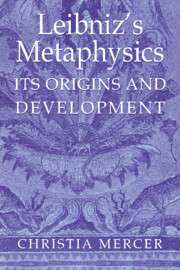Book contents
- Frontmatter
- Contents
- Acknowledgments
- References to Leibniz's works
- Introduction: first truths and half truths
- PART ONE METAPHYSICS OF METHOD
- PART TWO METAPHYSICS OF SUBSTANCE
- PART THREE METAPHYSICS OF DIVINITY
- 5 Platonist Assumptions
- 6 Metaphysics of Divinity, 1668–early 1671
- PART FOUR METAPHYSICS
- Appendix I (Not exactly) First truths
- Appendix II Leibniz's original assumptions
- Bibliography
- Index Locorum
- Index
5 - Platonist Assumptions
from PART THREE - METAPHYSICS OF DIVINITY
Published online by Cambridge University Press: 12 March 2010
- Frontmatter
- Contents
- Acknowledgments
- References to Leibniz's works
- Introduction: first truths and half truths
- PART ONE METAPHYSICS OF METHOD
- PART TWO METAPHYSICS OF SUBSTANCE
- PART THREE METAPHYSICS OF DIVINITY
- 5 Platonist Assumptions
- 6 Metaphysics of Divinity, 1668–early 1671
- PART FOUR METAPHYSICS
- Appendix I (Not exactly) First truths
- Appendix II Leibniz's original assumptions
- Bibliography
- Index Locorum
- Index
Summary
In 1277, professors at the relatively new university in Paris were troubled by the sudden popularity of the Aristotelian philosophy. Many considered it dangerously anti-Christian. They reacted by condemning over 200 propositions. Among those condemned were the claims that there is no more excellent way of life than the philosophical (article 40), that only philosophers are wise (article 154), and that our intellect by its own natural power can attain knowledge of God (article 211). Among many other things, the professors intended to make clear that Christianity was the only means to the truth and that the goal of philosophy was knowledge of the Christian God. The 219 propositions condemned in 1277 neatly reflect the struggle in medieval and early modern thought between philosophical speculation and Christian truth. Because the mysteries of faith and the revealed doctrines were a necessary means to truth and salvation, philosophical study could not by itself secure them. Philosophers might approach the truth on some issues, but they were bound to miss the mark on others.
The young Leibniz concurs. In chapters 2, 3, and 4, I have presented the development of Leibniz's Metaphysics of Substance and have argued that his earliest philosophical proposals are often carefully crafted to conform to Christian doctrine in general and to revealed truth (e.g., about transubstantiation) in particular.
- Type
- Chapter
- Information
- Leibniz's MetaphysicsIts Origins and Development, pp. 173 - 205Publisher: Cambridge University PressPrint publication year: 2001



